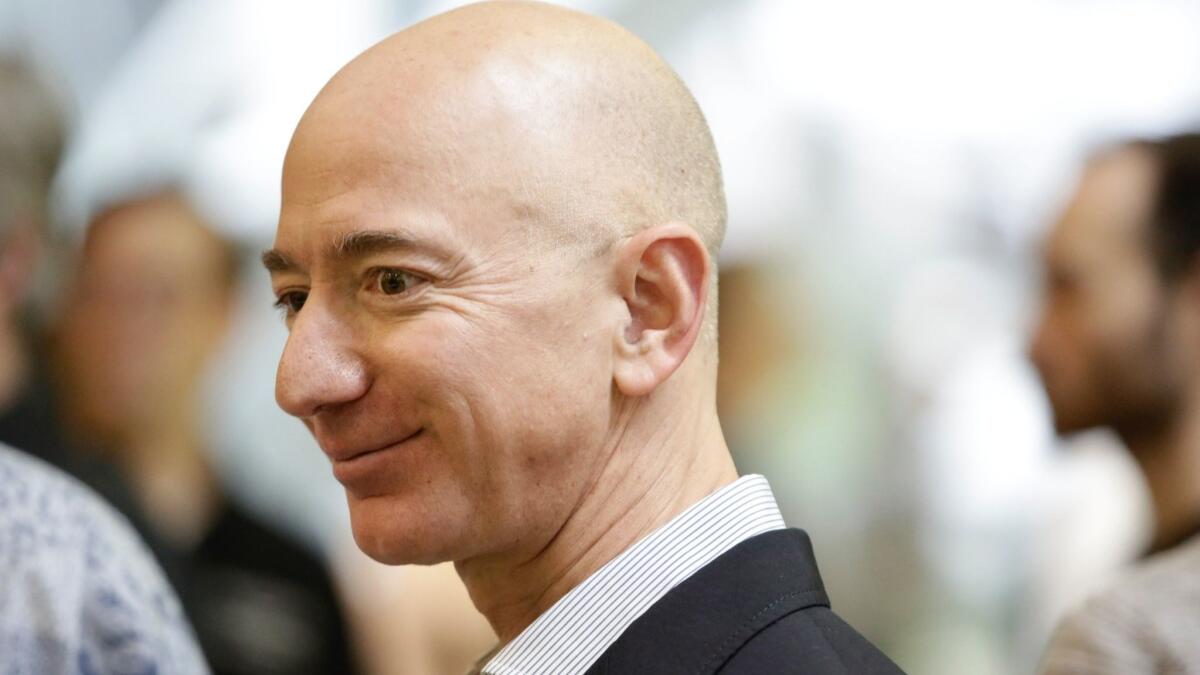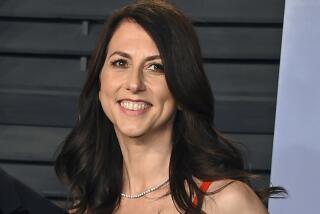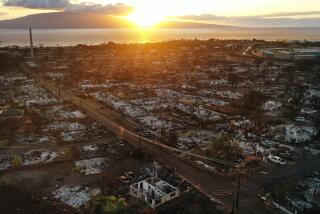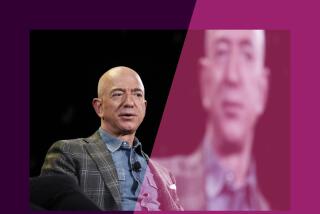Amazon’s Jeff Bezos launches $2-billion fund to help homeless families and create preschools

Jeff Bezos and his wife, MacKenzie Bezos, are launching a $2-billion fund to help homeless families and create a network of nonprofit preschools in low-income communities.
The move catapults the world’s richest person into a rarefied group of billionaire mega-donors at a time when his company, Amazon.com Inc., faces growing scrutiny over its rising power and impact on the economy.
The Bezos Day One Fund will focus on two initiatives, the billionaire announced in an online post Thursday. The first will fund existing nonprofits and issue annual awards to organizations doing “compassionate, needle-moving work” to shelter and support the immediate needs of young families. The second will operate a network of high-quality, full-scholarship Montessori-inspired preschools. The fund’s vision statement comes from nonprofit Mary’s Place in Seattle: No child sleeps outside.
“We’ll use the same set of principles that have driven Amazon,” Bezos wrote. “Most important among those will be genuine, intense customer obsession. The child will be the customer.”
With a personal fortune of $163.8 billion, according to the Bloomberg Billionaires Index, the Amazon.com Inc. chief executive had previously been largely invisible in the world of philanthropy. His net worth has risen by $64.7 billion this year alone as Amazon’s shares have surged. Bezos’ relative silence was a stark contrast to peers such as Bill Gates, whose foundation is the world’s largest, and Warren Buffett, who has vowed to give away the majority of his wealth.
Last year, Bezos solicited advice from the public via Twitter, asking how he could best use his wealth to help people “right now.” At the time, he said he was interested in funding projects to help people at the intersection of urgent need and lasting impact. The missive set off a frenzy of responses from every corner of the world, including pleas to support healthcare and loan forgiveness and even offbeat appeals to back a leather fetish museum in Chicago.
Until now, Bezos, 54, had taken only small steps into philanthropy. The Bezos Family Foundation, best known for its support of children’s education, has been largely funded by his parents from Amazon holdings they acquired as early investors in their son’s enterprise. Outside of that, Bezos and his family’s known donations have included gifts to Princeton University and Seattle’s Fred Hutchinson Cancer Research Center, according to the Chronicle of Philanthropy.
It’s not surprising that the world’s richest person “is finally getting serious about philanthropy,” said David Callahan, founder of the website Inside Philanthropy. “With big fortunes like that, the only thing you can really do is give it away — unless you want the government to take half of it through estate tax.”
The staggering fortunes of the likes of Bezos, Gates and Facebook Inc. CEO Mark Zuckerberg have created a second Gilded Age in the United States and “a new generation of mega-givers,” Callahan said. “It was only a matter of time before Bezos would join this new era of big philanthropy.”
The Bezos gift is one of the biggest single donations ever announced for preschools, if not the biggest, said Avo Makdessian, director of the Silicon Valley Community Foundation’s Center for Early Learning. As with most investment decisions by the Amazon founder, this one was likely grounded in data and science. Research shows 90% of a child’s brain development occurs before the age of 5, yet most charitable gifts pegged for education target older children, according to Makdessian.
Details about Bezos’ preschool plans are scant. It’s unclear how many children the schools will serve, where they will be and when they will open. Nationwide, 58% of 3-year-olds and 34% of 4-year-olds were not enrolled in nursery school, preschool or kindergarten in 2016, according to a recent Education Department report.
Some of the world’s richest people have begun giving away their wealth while still running companies, while others embrace philanthropy full-time after stepping away from day-to-day business. Increasingly, the wealthy want to see their charitable giving put to work on immediate needs.
Gates didn’t fully throw himself into philanthropy until he stepped down as CEO of Microsoft Corp. in 2000. Since then, he and his wife have built the Bill & Melinda Gates Foundation, which had an endowment of $51 billion at the end of 2017 and pledges to spend all its resources within 20 years of its founders’ deaths. Zuckerberg, 34, and his wife, Priscilla Chan, said in 2015 that they planned to give away 99% of their Facebook stock. Zuckerberg’s shares in the social network are valued at about $61 billion.
About 184 of the world’s wealthiest individuals and families, including Tesla Inc.’s Elon Musk and the co-founders of Airbnb Inc., have joined the Giving Pledge, a commitment started by Gates and Buffett to give away at least half their wealth. Michael Bloomberg — the owner of Bloomberg LP, parent of Bloomberg News — also is a signatory.
American billionaire philanthropy is spreading elsewhere. In places such as China and the Middle East, where public acts of charity are less common, the wealthy are starting to formalize their giving. This month, Jack Ma, Alibaba Group Holding Ltd. founder and China’s richest man, announced plans to step down and focus more on a new foundation that he said was inspired in part by Gates’ example.
While Bezos was thinking about where best to put his own money, Amazon stepped up its corporate giving, focused on growing inequality in its hometown of Seattle. Some activists and politicians have partly blamed the city’s problems on Amazon.
In 2016, Amazon renovated a vacant hotel on land designated for its new headquarters so it could be used temporarily by the nonprofit Mary’s Place to shelter 200 homeless families. Amazon is designating 47,000 square feet of space at its new corporate office for a permanent Mary’s Place shelter.
However, this year, under pressure from Amazon and other large employers, Seattle’s City Council repealed an employee head tax designed to provide housing and services for the homeless. In a statement, Amazon called the vote “the right decision for the region’s economic prosperity. We are deeply committed to being part of the solution to end homelessness in Seattle and will continue to invest in local nonprofits” that work with the homeless.
A week ago, Sen. Bernie Sanders (I-Vt.) introduced a Senate bill — the “Stop BEZOS Act” — that would require large employers such as Amazon and Walmart to pay the government for food stamps, public housing, Medicaid and other federal assistance received by their workers.
The bill’s name is a dig at Bezos and stands for “Stop Bad Employers by Zeroing Out Subsidies Act.” Sanders said it would establish a 100% tax on government benefits received by workers at companies with at least 500 employees.
Amazon has fired back against Sanders and his claims that thousands of Amazon employees rely on federal benefits to make ends meet, calling his figures “inaccurate and misleading.”
Times staff writer Lauren Raab and Washington Post staff writer Abha Bhattarai contributed to this report.
UPDATES:
12:55 p.m.: This article was updated throughout with additional details about Bezos’ fund and information on wealthy donors and a bill proposed by Sen. Bernie Sanders.
This article was originally published at 9:45 a.m.






